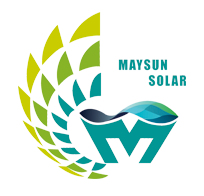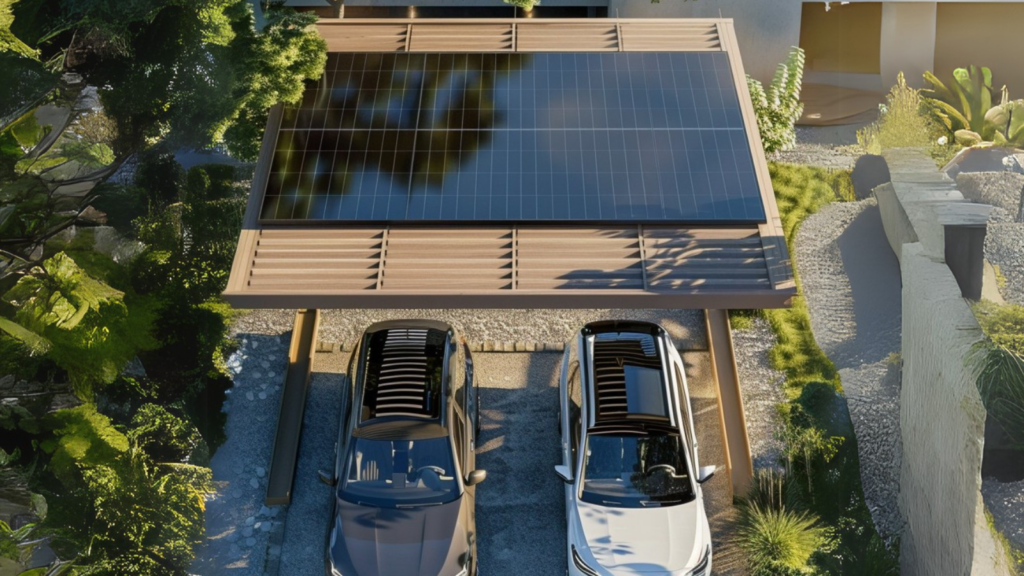Solar carports are becoming increasingly popular in Europe as homeowners and businesses look for innovative ways to utilize solar energy while protecting their vehicles. These structures combine parking spaces with solar panels, providing both vehicle coverage and renewable energy generation. Unlike traditional rooftop solar systems, solar carports are easier to install since they don’t require modifications to existing roofs. This makes them a simpler, more accessible option that can even be a DIY project, as long as you have the necessary skills and the assistance of a licensed electrician. Understanding the costs, installation process, and potential tax incentives associated with solar carports can help you make an informed decision.
Solar Carport Considerations
When considering a solar carport, the cost depends on several factors, including the number of cars to cover, whether you buy a kit, do it yourself, or hire a professional installer.
Size
A typical European midsize vehicle is about 4.5 x 2 meters, while a standard residential solar panel measures around 1.6 x 1 meter. For a carport to cover two parked cars, you’ll likely need 20 to 24 solar panels. With each panel weighing approximately 18 kilograms, a carport with 20 panels would need to support around 360 kilograms or more.
Output
A typical solar panel generates between 270 and 300 watts. A 20-panel system would produce between 5.4 and 6 kW, while a 24-panel system could generate 6.4 to 7.2 kW. This output is generally sufficient to cover the average household’s annual electricity needs in many European countries, depending on sun exposure and panel efficiency.
Cost
Recent data indicates that residential rooftop solar installations in Europe cost around €1.80 to €2.20 per watt. For a 5.4 kW system, the total cost could range from €9,720 to €11,880, while a 7.2 kW system might cost between €11,520 and €15,840. However, solar carports can be simpler to install than rooftop systems, potentially lowering costs. Without specific data on solar carport installations, it’s best to get a quote from a specialist. Many countries offer financial incentives such as tax credits or local rebates, which can help offset the cost.
Installation
The installation process is straightforward but involves key considerations. If you choose to build a solar carport yourself, you could save significantly. The cost for a 20-panel system starts from around €3,300, with a 24-panel system priced at about €3,950. Even when factoring in the frame, racking, wiring, and permits, a DIY project can cost between €4,500 and €12,500, depending on the complexity.
For professional installation, costs will rise due to “soft costs” like design, permits, and inspections, which typically account for two-thirds of the total installation price. It may be more cost-effective to install both a rooftop system and a solar carport, spreading out the soft costs over a larger project.
Alternatively, specialised companies offer kits for homeowners or businesses to install solar carports themselves. If you have the DIY skills, you could build a solar carport with the help of a licensed electrician, as long as you follow local building regulations and codes.

Solar Carport Tax Incentives in Europe
In Europe, the availability of tax incentives for solar carports varies across countries, each offering its own set of regulations and financial support mechanisms to promote renewable energy. Below are key insights into the solar carport tax incentives in some of the most significant European markets.
Germany
Germany is one of the leading countries in promoting renewable energy, and solar carports are no exception. Under Germany’s Renewable Energy Sources Act (EEG), individuals and businesses installing solar systems, including those integrated into carports, can benefit from attractive incentives.
For residential solar systems, including carports, VAT exemptions apply if the system is used for self-consumption. This is particularly beneficial for installations up to 10 kWp. Moreover, under the EEG, solar energy systems can receive feed-in tariffs when electricity is either consumed on-site or sold back to the grid. These tariffs are adjusted based on the amount of energy generated and the size of the system, making it a cost-effective option for many.
Additionally, Germany allows for tax benefits under Section 12 of the German Value Added Tax Act (UStG), which grants VAT exemptions for solar systems used for residential self-consumption. For larger systems used for electric vehicle charging, additional incentives might apply.
France
In France, the Energy Transition Tax Credit (Crédit d’impôt pour la transition énergétique, CITE) and the Superbonus 110% offer considerable savings for those looking to install solar carports. The Superbonus 110%, introduced as part of the Energy Transition Law, allows homeowners to receive up to 110% of the cost of energy efficiency improvements, including the installation of solar systems. This means that solar carports installed as part of a renovation project could be fully funded, making the system highly attractive.
In addition to the Superbonus, solar carports are eligible for a reduced VAT rate of 5.5% under Article 199 of the French Tax Code, which applies to residential solar systems installed for self-consumption. This incentive makes it more affordable for individuals to invest in solar energy solutions.
Italy
Italy’s Superbonus 110% is one of the most generous tax incentives available for renewable energy projects, including solar carports. The law allows homeowners to deduct up to 110% of the installation costs for energy efficiency improvements, which include solar systems. This means that the cost of installing a solar carport as part of a home renovation can be fully covered, potentially even yielding a net gain from the tax deduction.
Moreover, like many other European countries, Italy applies a reduced VAT rate of 10% for solar systems, including carports, when the system is used for residential self-consumption. This VAT reduction is governed by Article 124 of the Italian VAT Law and makes it more affordable for homeowners to install solar systems on their properties.
Spain
Spain offers a combination of national and regional incentives for solar carports, driven by the Self-consumption Royal Decree (Real Decreto de Autoconsumo). Under this law, households and businesses can install solar systems, including carports, and receive financial support for self-consumption. This can significantly reduce electricity bills and provide a quick return on investment.
Additionally, Spain offers various regional subsidies that provide additional rebates or grants for solar installations, including those mounted on carports. Royal Decree 244/2019 specifically encourages the installation of solar systems for self-consumption, and these incentives can be combined with local government support to make the investment even more affordable.
Before moving forward with your installation, it’s important to check the specific regulations and available subsidies in your country. Working with a local renewable energy expert or tax advisor can help you navigate these incentives and maximize your savings.
In conclusion, solar carports offer a practical and sustainable solution for generating renewable energy while protecting vehicles, with increasing adoption across Europe. The costs, installation process, and available tax incentives can vary significantly depending on the country and system size, but overall, solar carports provide a cost-effective way to integrate solar energy into residential and business properties. From DIY options to professional installations, and with the support of generous tax incentives in many European countries, investing in a solar carport can result in substantial savings and a reduced carbon footprint. Be sure to research local incentives and consult with experts to make the most of this innovative energy solution.

Since 2008, Maysun Solar has been dedicated to producing high-quality photovoltaic modules, including advanced IBC, HJT and TOPCon panels, and innovative solutions like balcony solar stations. As solar carports become an increasingly popular choice for renewable energy generation across Europe, Maysun Solar’s products offer excellent performance and guaranteed quality for these applications. Whether you’re looking to integrate solar panels into a carport system or any other energy solution, Maysun Solar provides reliable, cutting-edge technology to meet your needs. With offices and warehouses established worldwide, we are committed to long-term partnerships with top installers to bring sustainable energy solutions to homes and businesses. For the latest quotes on solar panels or any photovoltaic-related inquiries, please contact us—we are here to help you make the most of your solar energy investment.
Reference:
Kuchta, D. M. (2022, February 14). Is a solar carport worth the investment? Overview, benefits, and drawbacks. Treehugger. https://www.treehugger.com/is-a-solar-carport-worth-the-investment-5205068
Kuchta, D. M. (2022, February 14). Is a solar carport worth the investment? Overview, benefits, and drawbacks. Treehugger. https://www.treehugger.com/is-a-solar-carport-worth-the-investment-5205068

Empowering Factories with Solar Energy A Strategic Tool for Controlling Production Electricity Costs
Commercial and industrial solar is becoming a key solution for factories to reduce electricity costs and hedge against price fluctuations. This article systematically analyzes its deployment models, cost advantages, and sustainable value pathways.

How Businesses Can Offset Carbon Taxes with Solar Power
This article analyzes the latest carbon tax policies and photovoltaic deduction strategies, helping European businesses legally reduce taxes, increase profits through solar investment, and achieve a win-win situation for both economy and environment.

Forecast and Response: Seizing the Next Decade’s Growth Dividend in Europe’s Commercial and Industrial Photovoltaics Market
Maysun Solar analyzes the growth trends of commercial and industrial photovoltaics in Europe over the next ten years, from policies and ESG to technological innovation, helping companies seize the initiative in the energy transition.

How to Calculate Solar System ROI and Optimize Long-Term Returns?
Solar power is becoming a key solution for businesses to reduce costs and improve efficiency. Accurately calculating ROI and optimizing long-term returns are essential to maximizing investment value.

Will Agrivoltaics Affect Crop Growth?
Agrivoltaics combines solar energy and agriculture to reduce up to 700 tons of CO₂ per MW, improve water use, and boost crop growth for sustainable farming.

6.5 Billion Loss Hits Photovoltaics: Reshaping or Elimination?
In 2025, the photovoltaic market may see a turnaround as some companies take early action. A €6.5 billion loss is driving businesses to explore new growth areas like energy storage and hydrogen. Which giants will break through? Industry transformation is accelerating!



